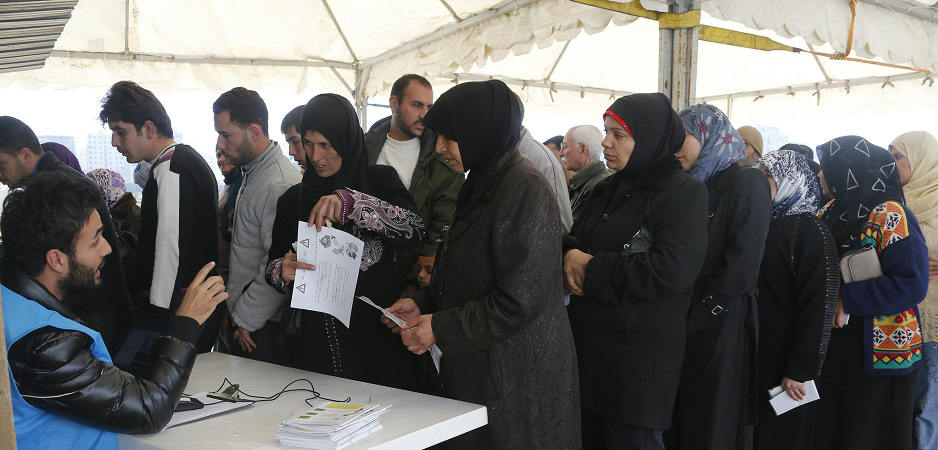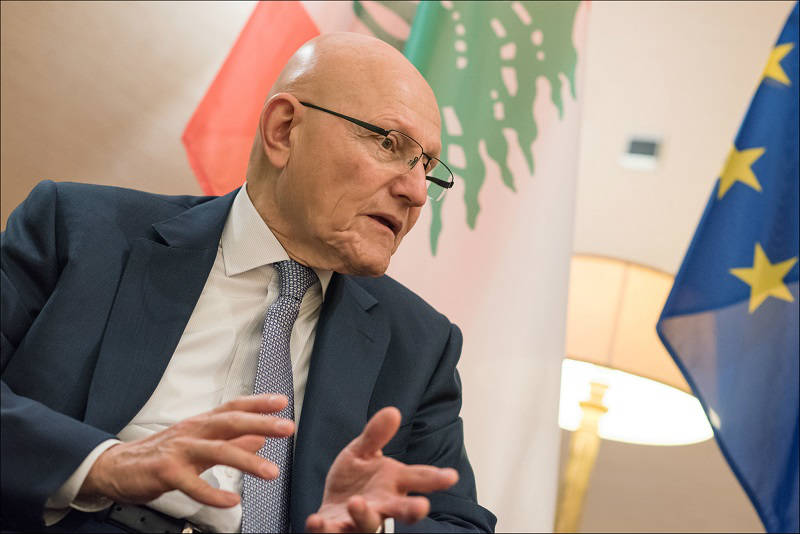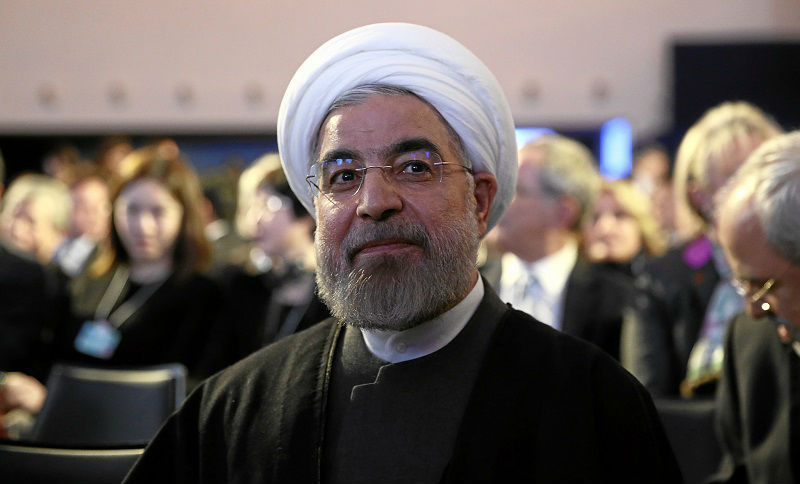The key to solving Lebanon’s multiple crises is rapprochement between Saudi Arabia and Iran.
On March 5, Lebanese Prime Minister Tammam Salam convened his cabinet for the first time since early February. Sessions were previously suspended over disputes concerning the mechanism that will be used in the decision-making process. While the meeting could be seen as a step in the right direction, Lebanon still faces multiple crises that threaten to topple the precarious balance that exists in the country.
Foremost, this is a political crisis as the political elite remain divided between two coalitions that support different regional powers, and they are unwilling to reach a compromise, thus prolonging the institutional stalemate.
It is also a social crisis as the massive influx of Syrian refugees in Lebanon has deteriorated the economic and social conditions of Lebanese. The presence of large numbers of refugees has put pressure on the state’s infrastructure, public health and school system, and it has caused a rise of inflation in accommodation and basic commodities.
Last but not least, Lebanon faces a security crisis as Sunni militias active in the Syrian Civil War try to expand their influence in Lebanon and create a de facto zone of influence in the country’s northeast, exploiting the support of Syrian refugees and Lebanon’s Sunni population.
Lebanon’s Institutional Stalemate
In May 2013, Lebanon entered a prolonged institutional crisis. Parliament failed to reach a compromise for a new electoral rule concerning parliamentary elections. It decided to prolong the tenure of the existing parliament for 15 months, allowing for the political blocs to reach a mutually beneficial compromise.
In a highly polarized society as Lebanon, elections have generally been a means to contain the sectarian and political tensions in the political arena. They have largely been held on time, with the exception of the civil war era between 1975-90.
However, the March 14 (dominated by the Future Movement and the Lebanese Forces party) and March 8 alliances (headed by the Free Patriotic Movement, Amal and Hezbollah) have not been able to reach a compromise, and the institutional crisis continues with parliament’s inability to elect a successor to former President Michel Suleiman, whose term expired on May 25, 2014.
Since then, there have been 22 failed attempts of the parliament to elect a new president, and the cabinet assumed presidential powers in accordance with the constitution. Moreover, in November 2014, parliament extended its tenure for another 31 months, invoking the precarious security conditions in many parts of the country and the dangers of a power vacuum as justification.
The last episode of the institutional anomaly was the deadlock reached on the government’s work. As the current government is a caretaker one but is also exerting presidential power, there was an initial agreement for decisions to be unanimously approved by all cabinet members. However, this mechanism proved unfunctional and many ministers suggested it ought to be replaced by a vote of majority in cases where a decision fails to meet an unanimous approval — a process that is also stipulated in the constitution. A small minority of ministers, however, continue to support the existing formula.
This rift compelled Prime Minister Salam to halt cabinet meetings for one month until a new formula was brokered. After a month of deliberations with political parties, Salam achieved the replacement of the principle of unanimity in the cabinet’s decisions with that of consensus. Under the new mechanism, if a decision is approved by the major political forces, then it will be implemented, regardless of the possible dissension of a smaller partner in government.
Nevertheless, Lebanon remains without a president, leaving a sense of discontent and under-representation among the Christian community, which in line with the unwritten National Pact of 1943 has the right to the presidency. Moreover, the current parliament lacks legitimacy, and the extension of its tenure was objected by Christian representatives (Michel Aoun’s Free Patriotic Movement party, the Kataeb party and the Maronite patriarch) and has met the disapproval of several civil society organizations, such as the Civil Movement for Accountability.
Lebanon is governed by a government that only recently resumed its work after a one month stalemate due to clashing political interests. This begs the question: What led to this institutional stalemate?
How the Regional Environment Affects Lebanese Politics
The rivalry between Saudi Arabia and Iran in Syria, and the negotiations of Iran with the West over Tehran’s nuclear program, have a direct impact on Lebanon’s political affairs. Iran exploits the influence it exerts in Lebanon in the nuclear negotiations, trying to use the normalization of institutional life in Lebanon to gain the West’s concessions on the nuclear issue. This became clear before the expiration of the November deadline, when Tehran reportedly sought Saudi Arabia’s help for reaching an agreement before November 24 in exchange for concessions on the presidential issue of Lebanon.
Lebanese Sunni politicians are also aware of the importance of Iran’s role regarding the Lebanese presidential election. Prime Minister Salam, for example, said in December: “Any settlement over the Iranian nuclear program will pave the way to solving Lebanon’s political deadlock that left the country without a president.”
But even if all sides achieve a positive outcome in the nuclear negotiations, is Iran ready to accept all possible candidates for the office of president in Lebanon?
Considering the special importance of southern Lebanon for Iran’s regional strategy, as Yahya Safavi, a senior military aide to Ayatollah Ali Khamenei, stressed in May 2014, Iran and Hezbollah will not accept a president who will question Hezbollah’s arsenal and regional role as its proxy. Consequently, Iran will not accept a candidate of the March 14 bloc, which has slammed Hezbollah’s role in the past and is an opponent of the resistance bloc. Even former President Suleiman, who was theoretically an ideal candidate for Hezbollah as he closely cooperated with the Syrian regime from 1990-2005, changed his stance and unsuccessfully put pressure on Hezbollah regarding an agreement on its arsenal.
Syrian Refugees
The fighting in Syria also affects Lebanon’s stability. According to data from the United Nations, nearly 1.2 million refugees from Syria reside in Lebanon, a figure that is approximate to 25% of the Lebanese population. This massive influx of refugees was the result of an open border policy by the Lebanese government, practiced until recently when Beirut decided in January to set certain criteria for the provision of visas and to limit the duration of stays.
Despite this measure, the Lebanese government has lacked a specific policy to manage this influx, including a just geographical allocation of refugees to avert encumbering regions that already have encountered economic and social problems.
This lack of policy lets refugees choose the place in which they would be settled. The vast majority of the refugee population (86%), according to Al Akhbar, has been settled in “the most marginalized areas of the country, where 66% of the Lebanese population is deprived.” According to journalist Moe Ali Nayel, this happened because “many refugees from certain sects ended up going to the areas that are known in Lebanon to belonging to a certain sect, feeling that maybe they have families there or relatives.”
Another factor, as Nayel explains, that contributed to this outcome was socioeconomic status. A majority of refugees that came from impoverished areas in Syria entered Lebanon without money and “ended up settling in impoverished areas in Lebanon, because it suited their [economic] status.”
The settlement of the refugee population caused a double sense of resentment: First, resentment by poor Lebanese who see the refugees as competitors for the same jobs, humanitarian aid and access to public services; and second, a sense of resentment relating to middle-class Lebanese who view a significant number of educated Syrians, usually with technical knowledge, to be a cheap work force employed by many companies to their own detriment.
Another point of controversy that inflicts the same class has to do with the fact that many Syrians have set up small businesses that sell usually smuggled goods at lower prices, forcing many Lebanese retail businessmen into bankruptcy.
This sense of resentment, in many cases, has turned into violence against refugees. According to Al Akhbar, “61% of host communities admitted that violent incidents were perpetrated against refugees in the past six months because they are seen as economic competitors and a drain on health services, the infrastructure and so on.”
Eva Shoufi further argues that the political system is also responsible for this development, playing once again the game of divide-and-rule, this time pitting Lebanese and Syrian poor against each other, while the business elite has at the same time significantly profited as the refugees’ presence created an oversupply of labor allowing them to curtail wages.
Security Factors
Another consequence of the Syrian conflict on Lebanon has been the deteriorating security situation due to the infiltration of Jabhat al-Nusra and the Islamic State (IS). The presence of jihadist organizations is the outcome of a number of factors. First, there is no a formal border agreement between Syria and Lebanon. According to Professor Issam Khalifa, the map of French Mandate authorities was “not based on accurate topographic data, but rather on general exploratory outlines that contained many irregularities.”
These borders did not take into consideration the tribal and sectarian relations across borders and were in practice neglected. The two governments agreed to work on a specific demarcation of their border line in 2008. However, until now no such agreement has been brokered, as Syria invokes the still occupied Shebaa Farms region as a factor that prevents the border’s delineation. This relativity of the borders means that the Lebanese army has never held strict security control over them.
This is related to the refugee problem. The aforementioned lack of management on behalf of the Lebanese authorities concerning the refugees’ settlement location led to a massive settlement in the Bekaa Valley, near the border line. This facilitated opposition militias that participated in the Syrian Civil War to trespass the border line, either to find shelter when they were under pressure from Syrian regime forces or to resupply. For example, Wadi Hmeid, a region north of Arsal, supplies rebels with food and gas as there is no army control there.
But safe havens for Islamist fighters in Lebanon were not the only result of the refugees’ presence. A strong sense of resentment among Lebanese Sunnis has built up during the last decade as they feel their community is losing its political status. A number of events contributed to this sentiment: the military defeat of Future Movement militiamen by Hezbollah in the 2008 conflict; the overthrow of the Saad Hariri government in 2011; the non-application of the Special Tribunal for Lebanon indictment for Rafiq Hariri’s assassination; and Hezbollah’s intervention against their coreligionists Sunni brothers in Syria.
Jihadist groups like Jabhat al-Nusra and the Islamic State try to exploit these tensions in order to enlist new fighters for the Syrian front, and to simultaneously hit Hezbollah inside Lebanon, thus broadening their appeal in the country. According to Mohammad Nemr, writing for An Nahar: “Jabhat al-Nusra and IS want to protect the Sunnis in Lebanon. They do not want the Sunni areas to be exposed to Hezbollah.” In the same article, an anonymous source from within Islamist circles mentions Jabhat al-Nusra’s intention to remain in Lebanon as long as Hezbollah retains its army.
Saudi-Iranian Rapprochement as the Key
Lebanon’s institutional paralysis, refugee and security problem have a common denominator: developments in the country’s regional environment. The contagion of the Arab Uprisings in Syria, which culminated initially in a fully-fledged civil war and then in a regional one, brought instability to neighboring Lebanon, propelling Lebanese players to intervention and polarizing the population into supporters and opponents of the Syrian rebels. What made things worse was the large influx of Syrian refugees and the appearance of Syrian rebel groups with jihadist orientation on Lebanese soil.
As Lebanese political parties have strong ties to their patrons in Tehran and Riyadh, it seems that Lebanon will continue to face these multiple crises until there is rapprochement between Saudi Arabia and Iran. Such rapprochement could bring a deal that would not only restore the function of Lebanese political institutions, but also settle the civil strife in Syria with all its aspects, including the elimination of jihadist organizations and the return of refugees to their homeland.
The views expressed in this article are the author’s own and do not necessarily reflect Fair Observer’s editorial policy.
Photo Credit: World Bank Photo Collection / European Parliament / World Economic Forum / Flickr
 We bring you perspectives from around the world. Help us to inform and educate. Your donation is tax-deductible. Join over 400 people to become a donor or you could choose to be a sponsor.
We bring you perspectives from around the world. Help us to inform and educate. Your donation is tax-deductible. Join over 400 people to become a donor or you could choose to be a sponsor.
Support Fair Observer
We rely on your support for our independence, diversity and quality.
For more than 10 years, Fair Observer has been free, fair and independent. No billionaire owns us, no advertisers control us. We are a reader-supported nonprofit. Unlike many other publications, we keep our content free for readers regardless of where they live or whether they can afford to pay. We have no paywalls and no ads.
In the post-truth era of fake news, echo chambers and filter bubbles, we publish a plurality of perspectives from around the world. Anyone can publish with us, but everyone goes through a rigorous editorial process. So, you get fact-checked, well-reasoned content instead of noise.
We publish 2,500+ voices from 90+ countries. We also conduct education and training programs
on subjects ranging from digital media and journalism to writing and critical thinking. This
doesn’t come cheap. Servers, editors, trainers and web developers cost
money.
Please consider supporting us on a regular basis as a recurring donor or a
sustaining member.
Will you support FO’s journalism?
We rely on your support for our independence, diversity and quality.









Comment